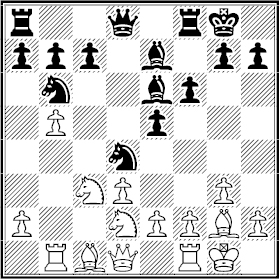
A shortage of squares often arises when a centralized piece must retreat.
Zurab Azmaiparashvili White
Ricardo Montecatine Rios Black
Seville 1994
English Opening A29
1 c4 e5 2 ♘c3 ♘f6 3 ♘f3 ♘c6 4 g3 d5 5 cxd5 ♘xd5 6 ♗g2
White threatens 7 ♘xe5! (7...♘xe5 8 ♘xd5 or 7...♘xc3 8 ♘xc6).
6...♘b6 7 0-0 ♗e7 8 ♖b1 0-0 9 b4
Shooting for b4-b5 is a good strategic plan and here it’s executed tactically: 9...♗xb4 10 ♘xe5! favors White, particularly after 10...♗xc3 11 ♘xc6!.
9...f6
On 9...♘xb4!? 10 ♘xe5 Black has traded a valuable center pawn for a wing pawn. But he gets active piece play (10...♗f5 11 ♖b3?? ♗c2).
Question 294: What about 11 d3 ?
10 b5 ♘d4!
White would be better after 10...♘b8? 11 d4!. Now, however, he should avoid 11 ♘xd4? exd4!. Then 12 ♘e4?? f5! and the knight is caught in a traffic jam.
11 d3 ♗e6
Not 11...♘xf3+ 12 ♗xf3 ♗e6? 13 ♗xb7 or 12...♖b8 13 a4! with a positional pull.
12 ♘d2
Here 12 e3? makes the d3-pawn a later target for a Black rook.

The position would be roughly balanced after, say, 12...♕c8 13 e3 ♘f5 14 a4.
12...♘d5? 13 ♗xd5! ♗xd5 14 e3! resigns.
The logjam costs a piece (14...♘e6 15 e4).
Gregory Koshnitsky White
Hewitt Black
Correspondence 1945
1 c4 e5 2 ♘c3 ♘c6 3 ♘f3 ♘f6 4 g3 ♗e7 5 ♗g2 d5? 6 cxd5 ♘xd5 7 ♘xe5! ♘xc3 8 ♘xc6 ♘xd1 9 ♘xd8 ♘xf2 10 ♘xf7 ♘xh1 11 ♘xh8 ♘xg3 12 hxg3 c6 13 ♗e4 g6 14 ♘xg6 hxg6 15 ♗xg6+ ♔d8 16 d4 ♗g4 17 e4 resigns.